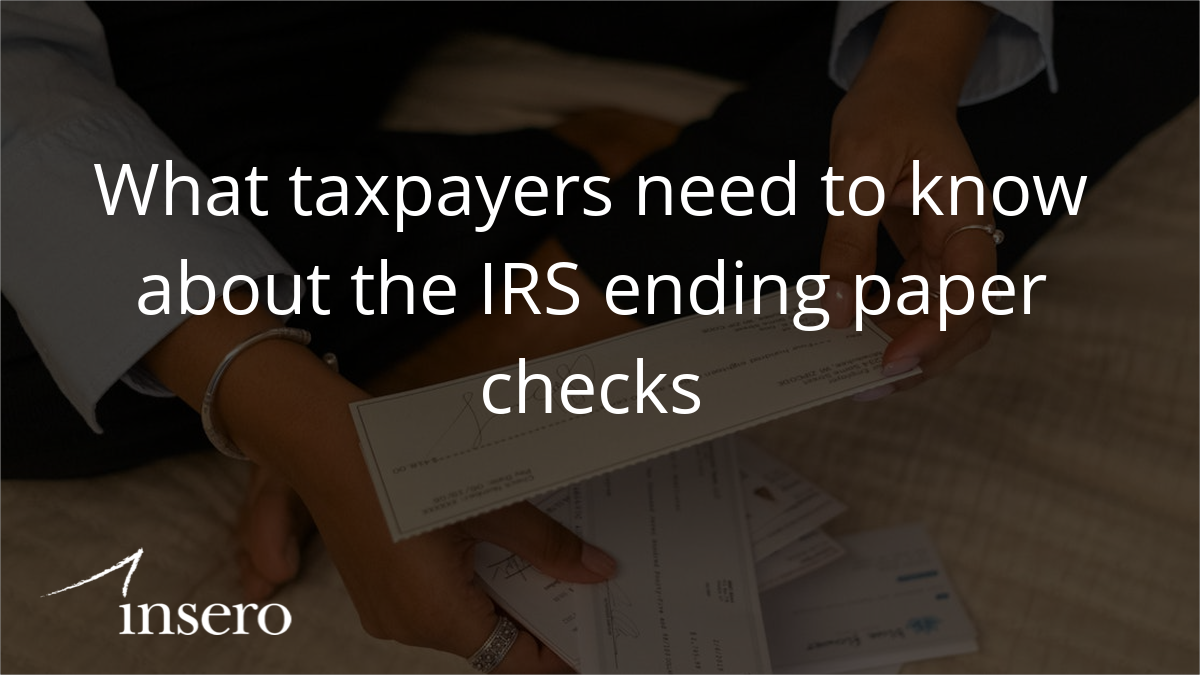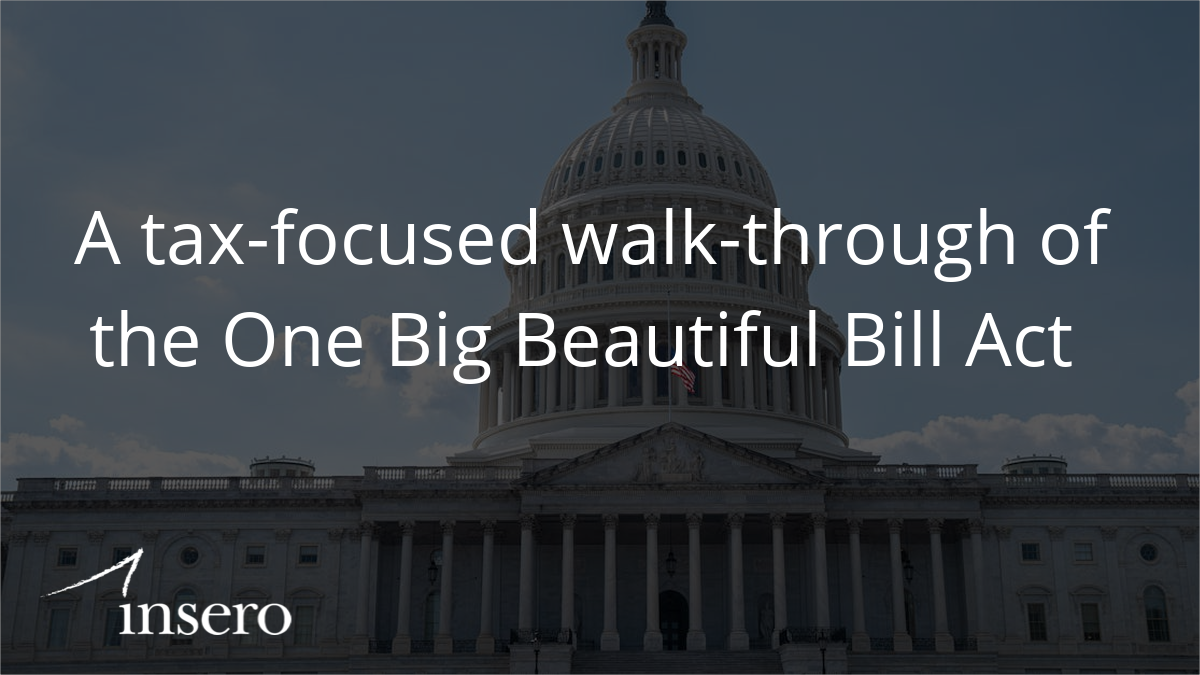ARTICLE | May 26, 2025
Executive summary: Congress may change SALT deductions and restrict PTET elections
The U.S. House of Representatives on May 22 approved a broad tax package that includes provisions that increase the state and local tax (SALT) deduction and preclude certain partnerships and S corporations from utilizing the state pass-through entity tax (PTET) regimes enacted by many states in the wake of the 2017 Tax Cuts and Jobs Act. Affected pass-throughs include many that operate practices of investment management, health care, law, accounting and other professional services.
An array of businesses and their owners—including many in professional services, financial services and health care—would have certain tax benefits severely restricted by proposals contained in the One Big Beautiful Bill Act, which the U.S. House of Representatives passed on May 22. The proposals include restricting income tax deductions for certain pass-through businesses and limiting owners’ ability to deduct from their federal taxes whatever state taxes they elect to pay at the entity level.
The House approved restrictions that would result in disparate treatment of two classifications of pass-through businesses: those that are so-called specified service trades or businesses (SSTBs) and those that are not.
SALT deduction proposals for pass-through entity tax (PTET) elections
The House tax bill extends or makes permanent many provisions enacted as part of the 2017 Tax Cuts and Jobs Act. Two prominent proposals would increase the limitation on deductions for certain state and local taxes and make it permanent. Under current law, the deduction is generally limited to $10,000 for joint filers and is set to expire at the end of 2025.
In addition to increasing the SALT deduction limitation, the House approved a proposal that would severely restrict the ability of certain pass-through businesses and their owners to avail themselves of the benefits of the PTET regimes that have been enacted by many states—and adopted by numerous pass-through businesses—over the last seven years. This could have significant negative impacts on after-tax cash flows for business and fund owners.
SALT cap: The House voted to increase the SALT deduction to $40,400 ($20,200 for a married taxpayer filing a separate return). For taxpayers with modified adjusted gross income over $505,000 ($252,500 for a married taxpayer filing a separate return), the cap would phase down 30% of the excess until it reaches $10,000 ($5,000 for married taxpayers). Additionally, the cap and phase out amounts would increase by 1% each year from 2026-2033, staying permanent after 2033.
Defining SALT deductions: Second, the bill includes language that defines the types of taxes that are taken into account when determining the deductibility (or lack thereof) of state and local taxes. It does this by limiting a taxpayer’s state and local taxes to the taxpayer’s aggregate amount of “specified taxes,” which are defined to include both of the following:
1) State and local and foreign property taxes, other than disallowed foreign real property taxes and state and local property taxes paid or accrued in a trade or business or an activity described in section 212.
2) State and local income, war profits, excess profits, and general sales taxes for which an election to take a deduction in lieu of state income taxes has been made, other than income taxes paid or accrued by a partnership or S corporation in carrying on a qualified trade or business (within the meaning of section 199A) if at least 75% of the gross receipts of all trades or businesses under common control of such partnership or S corporation are derived from qualified trades or businesses.
Implications for pass-through entities that do and don’t qualify for section 199A
The language of the second limitation results in a disparate treatment between pass-through entities operating “qualified” trades or businesses under section 199A, and pass-throughs operating SSTBs, i.e., those not qualifying under section 199A. SSTBs generally include law firms, accounting firms, investment firms, consulting firms, medical practices, and many other types of businesses.
Qualified trades or businesses and their owners would continue to be able to deduct pass-through entity taxes as business expenses of the pass-through entity. Those taxes are considered “excepted taxes” and therefore are excluded from the definition of a “specified tax” and “substitute payment.”
Conversely, SSTBs would be required to separately state those same pass-through entity taxes on Schedules K-1 provided to their owners. The taxes paid under the PTET regimes would be subject to the SALT limitation at owner level.
While the House-approved bill does increase the SALT deduction, in many cases there could be a substantial difference between a pass-through entity’s ability to deduct the payments in full as an expense of the business and those payments being subject to the restrictions imposed by the SALT limitation.
Different treatment of qualified pass-throughs and SSTBs: A closer look
The language in one of the first versions of the House bill arguably would have extended this limitation on the deductibility of PTET payments to all pass-through entities—irrespective of whether they were SSTBs or qualified businesses.
However, in response to concerns raised by practitioners and industry groups, the drafters acknowledged they had not intended to limit all pass-through businesses. The final bill was amended with a technical correction to alleviate concerns that all pass-through businesses would be subject to this PTET limitation.
Specifically, the correction excludes an “excepted tax” (defined above) from the definition of what the bill refers to as a “substitute payment.” Effectively, it’s a payment by a pass-through entity of a state income tax, for example, that results in an owner receiving a specific tax benefit, such as a credit against their state income tax liability.
The final bill also includes a technical correction resolving the apparent unintended exclusion of general sales taxes from deductibility at the pass-through level. That treatment, absent correction, would have represented a major departure from the historical norm.
Aside from the illogical treatment of SSTBs compared to their qualified business counterparts, there may also be some inconsistency depending upon the type of tax that is being paid by the pass-through entity. For example, it not uncommon for a multistate business entity to pay state income taxes, such as pass-through entity taxes or other state income taxes imposed by a state on the business itself; local income taxes, such as the New York City Unincorporated Business Tax (UBT), sales taxes and property taxes.
The House-approved bill could result in certain state and local taxes that have historically been levied, and paid and deducted by, a pass-through entity now considered to be separately stated items and thus subject to the SALT limitation for business owners operating SSTBs. For example, subjecting the New York City UBT to the SALT deduction limitation. Additionally, state and local taxpayers will likely need clarification on what types of the many state and local taxes qualify under section 164(a)(3).
Takeaways for pass-through businesses and their owners
The House bill’s SALT limitation proposals are complex and, despite the appearance of a carrot in the form of an increased deduction, may in fact be a stick for many service businesses and their owners simply because of the nature of their business operations.
The proposed changes to the SALT deduction provide for seemingly arbitrary treatment of SSTBs in comparison to qualified businesses—not to mention in comparison to businesses operating as C corporations, which would continue to be able to deduct state and local taxes in full. Indeed, it seems hard to find economic justification for treating SSTBs differently from other pass-through businesses for purposes of the PTET regimes.
Critically, there is still a long way to go in the tax reform legislative process. The Senate in June will take up potential tax changes, and it may be some time before we know what final legislation in this area will look like. In the interim, we will continue to monitor, review, and analyze the proposals as they take shape, and provide updates and insights throughout the process.
Let’s Talk
Fill out the form below and we’ll get back to you to discuss your specific situation.
This article was written by Kyle Brown, Matt Talcoff, Andy Swanson, Mo Bell-Jacobs and originally appeared on 2025-05-26. Reprinted with permission from RSM US LLP.
© 2024 RSM US LLP. All rights reserved. https://rsmus.com/insights/tax-alerts/2025/bill-limits-salt-deductions-for-some-financial-and-professional-services-firms.html
RSM US LLP is a limited liability partnership and the U.S. member firm of RSM International, a global network of independent assurance, tax and consulting firms. The member firms of RSM International collaborate to provide services to global clients, but are separate and distinct legal entities that cannot obligate each other. Each member firm is responsible only for its own acts and omissions, and not those of any other party. Visit rsmus.com/about for more information regarding RSM US LLP and RSM International.
The information contained herein is general in nature and based on authorities that are subject to change. RSM US LLP guarantees neither the accuracy nor completeness of any information and is not responsible for any errors or omissions, or for results obtained by others as a result of reliance upon such information. RSM US LLP assumes no obligation to inform the reader of any changes in tax laws or other factors that could affect information contained herein. This publication does not, and is not intended to, provide legal, tax or accounting advice, and readers should consult their tax advisors concerning the application of tax laws to their particular situations. This analysis is not tax advice and is not intended or written to be used, and cannot be used, for purposes of avoiding tax penalties that may be imposed on any taxpayer.




